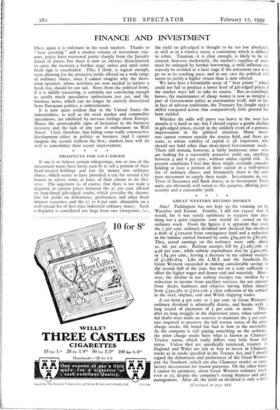PROSPECTS FOR GILT-EDGED
If one is to believe certain whisperings, one or two of the investment trusts have lately seen fit to sell a portion of their fixed-interest holdings and put the money into ordinary shares, which seems to have provided a cue for several City houses to advise some, at least, of their clients to do like- wise. The argument is, of course, that there is too wide a disparity at current prices between the 3,1 per cent. offered on long-dated gilt-edged stocks, which provides the datum- line for yields on debentures, preferences and other fixed interest securities, and the 54 to 6 per cent. obtainable on a well-spread list of first-class industrial ordinary shares. Such a disparity is considered too large from two viewpoints, i.e., the yield on gilt-edged is thought to be too low absolutely as well as in a relative sense, a contention which is difficult to rebut. Taxation, it is clear enough, is likely to be in- creased, however moderately, the market's supplies of stock must be enlarged by further borrowing, a mild inflation can scarcely be avoided at a later stage if the armament race is to go on at its cracking pace, and in any case the political risk seems to justify a higher return than is now offered.
We have here a formidable array of " bear points " which could not fail to produce a lower level of gilt-edged prices if the market were left to take its course. But, as everybody knows, the maintenance of cheap money is now as integral a part of Government policy as rearmament itself, and so far, in face of adverse conditions, the Treasury has fought such a skilful rearguard action that comparatively little ground has been yielded.
Whether the odds will prove too heavy in the next few months it is hard to say, but I should expect a gentle decline in gilt-edged prices, except in the unlikely event of a genuine improvement in the political situation. Many inves- tors cannot venture outside the trustee field, and there are some, to whom stability of capital is all important, who should not hold other than short-dated Government stocks. There still remain, however, a fairly numerous class who are looking for a reasonably attractive yield, say, anything between 4 and 6 per cent., without undue capital risk. In present conditions I feel that these might certainly consider holding at least a portion of their capital in a well-spread list of ordinary shares, and fortunately there is the unit trust movement to supply their needs. Investments in, say, Trust of Insurance and Bank shares, or in Investment Trust units, are obviously well suited to this purpose, offering good security and a reasonable yield.










































 Previous page
Previous page